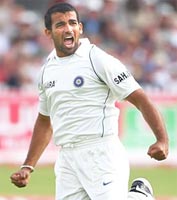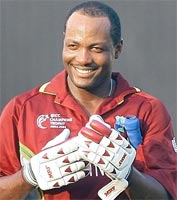Ian Bishop was touted as one of the best fast bowlers to emerge from the Caribbean. Tall and athletically built, he raced to his first hundred wickets in only 21 Tests and became the fastest West Indies bowler to reach the milestone.
Since making his international debut in 1989, he was a vital member of West Indies teams, but severe back injuries laid him low in 1991. He returned the following year after making adjustments to his action, but could not continue for long as the injuries recurred. He quit the game in 1998, aged 31, after playing 43 Tests and claiming 161 wickets at an impressive average of 24.27.
In one-day internationals he had a haul of 118 wickets in 84 matches.
Bishop is in the United Kingdom, covering the India - England Test series for 'Cricket on Five'. Special Correspondent Harish Kotian engaged him in a freewheeling chat, at Trent Bridge, during which he spoke on the Indian pace attack and Brian Lara's retirement among other things.
You have seen the India's fast bowling very closely in the last few months, having watched the team in the series in South Africa and now here in England. Being a top class fast bowler yourself, what is your take on the Indian pacers?
They each have their individual strengths. Zaheer Khan is now showing the experience of playing years of cricket, particularly his stints here [England] for Worcestershire. He seems to be in good command of his game -- bowling over the wicket, around the wicket, out-swingers, in-swingers from both angles with good precision and not being discomforted by changing the angles.
Sreesanth has struggled on this tour so far. As we saw in South Africa, I think he is a good bowler but, as all bowlers do, he is going through a period where his rhythm is off and he doesn't quite seem to know how to deal with it. He just has to keep it simple at the moment because he presents a good seam position and a good out-swinger. So I think he just needs to work for it.
R P Singh is not to be underestimated. He is a bit quicker than he looks, but also another young player who will need experience and knowing when to be consistent as he goes along.
I think they all have done a good, decent job, led by Zaheer, but still they need, particularly Sreesanth and R P, to lift their game a bit more.
Zaheer has been a revelation on the tour. Every time he has come on to bowl he's looked like getting wickets. What changes do you see in his bowling recently?
 His experience and control are exactly what I emphasized just now. He has suttle changes of pace; he is not trying to be express or a fast medium bowler that he tried to be when he just burst on to the scene. What he uses now is that he changes the angles, changes his pace, slips up a gear, down a gear, and he has good control over his wrist position which allows him to move the ball away and into the batsman from round the wicket.
His experience and control are exactly what I emphasized just now. He has suttle changes of pace; he is not trying to be express or a fast medium bowler that he tried to be when he just burst on to the scene. What he uses now is that he changes the angles, changes his pace, slips up a gear, down a gear, and he has good control over his wrist position which allows him to move the ball away and into the batsman from round the wicket.
So he is the senior guy here who is probably is at the peak of his career in terms of his experience, and that is good to see him bowling well in different conditions.
England's inexperienced pace attack did a good job in the first Test at Lord's. But don't you think once the Indian batsman got stuck in the second Test, they looked short of ideas?
I thought there is a measure of inexperience and that is a challenge with young attacks. They bowled well at Lord's, but doing it consistently is what separates the experience campaigners from the lesser ones. But I don't think that the England bowlers, [James] Anderson apart, bowled that badly.
What I thought the difference was the application of the Indian batsmen, not the senior guys. To say the senior guys did everything would be to understate the opening partnership of young [Wasim] Jaffer and Dinesh Karthik. I thought, on the whole, India's batting was more dogged; it was more determined, it was more focussed than maybe England's batting in the first innings. Talk about it as much as you want, India was just more committed up to this point with the bat.
Sachin Tendulkar's batting has been a topic of debate in the last few seasons. He has mellowed down a lot in recent years and now prefers to play the waiting game. What is your observation, having played with him during his prime?
I will sit back and appreciate different things from Tendulkar. I played against him at his peak, I played against him at the very beginning of his career in fact, in 1990, when he was here, and then in the Caribbean in the mid 1990s. Now, obviously, he has lost a lot of his flair and a lot of things in his youth, when his body would allow him and his mind was fresh, his hand-eye co-ordination was at its peak.
He is much a different player now. As all great players, most great players have to adjust their game in their mid thirties; their reflexes would slow a bit, their instincts would be curbed. It is a natural tendency. So people are being very unfair when they criticise him for being a different player now. They should not do that because nobody can play the same at the start, in the middle and at the end of their career. With advancing age he has become a more solid player.
He realises, in fact he has done that in the last two years, that he has to change his game, alter his game, curb some shots, spend some more time at the crease in order to score more runs and do that for the benefit of the team.
I appreciate his stubbornness [on day three of the second Test] not to give in; so I would not criticise him. What I do is appreciate the changes that he has made and the contribution that he would still be able to make.
Another batting great, Brian Lara, quit the sport this year. How much will his retirement impact West Indies cricket, which has failed to deliver in the last few years?
 Well, to put it in a perspective, West Indies have struggled for the last ten years and Brian Lara has been around for all that time. So that has to be looked back, that has to be taken into perspective that even while he was at his peak West Indies were still struggling. It will happen to all the players. Sachin Tendulkar, Rahul Dravid, Sourav Ganguly, VVS Laxman will one day pass on it as was the case with [Sunil] Gavaskar, [Vivian] Richards and [Donald] Bradman.
Well, to put it in a perspective, West Indies have struggled for the last ten years and Brian Lara has been around for all that time. So that has to be looked back, that has to be taken into perspective that even while he was at his peak West Indies were still struggling. It will happen to all the players. Sachin Tendulkar, Rahul Dravid, Sourav Ganguly, VVS Laxman will one day pass on it as was the case with [Sunil] Gavaskar, [Vivian] Richards and [Donald] Bradman.
West Indies have to move on, and players now need to find within themselves the resolve to fill the gap either individually or collectively. There will never be another Brian Lara. There will never be another Sachin Tendulkar. So they have to find their own impetus, their own way of surviving.
What do we now is celebrate what Brian Lara has done, appreciate the memories he has given us over the years and be thankful that we were able to see him grace the fields in our generation. But cricket always goes on and someone else always comes on.
You have played a lot with Lara. Any special memories of the batting legend you will cherish?
I have many memories. You have to remember that I played with Lara since age 14. To pick one memory would do disservice to a lot of his batting exploits, his tactical acumen, his fielding -- he was a brilliant slip fielder -- and many of the innings at the first class level that I have seen him play.
As always, one of most memorable times that I still pick out was when we defeated India in Barbados in 1996-97, when India were chasing 120. Brian was captain for that match and, as always going into the final day, we sat down and we planned as a unit. Obviously, he being the captain, he took the lead and sort of directed us to how we should orchestrate particularly Tendulkar's dismissal.
And just the environment, the atmosphere, the discussion that night and seeing him come up to us as leader then, it was a fantastic Test match just to be part of and he has to take a fair amount of credit for the outcome then. That is the one that stands out to me for those reasons.
What has gone wrong for West Indies cricket in the last 10 years? Why has it not lived up to it's potential? How they can get out of it?
Yes, the observations that you make are correct. West Indies cricket has not lived up to its potential; it should be better than this. Everybody is disappointed, and quite rightly so!
I don't think its rocket science the way forward; it takes planning, takes selflessness from the administration, which will eventually rub off on the players. The administration has to take the lead, and once that change of culture comes from the administration, where development programmes are put in place, where infrastructure is set up better playing facilities and management of first class teams. That's where the important information needs to be applied.
The first class structure demands that players come to work everyday, have a high work ethic, prepare well and professionalize themselves and be remunerated for their performance. It won't be that difficult to change, I think given three to four years and we will see improvement, because I think in the West Indies talent is much better in terms of performances that we are seeing at the moment. I am hopeful and I am very positive about the young players that we have, like fast bowlers Ravi Rampaul, Jerome Taylor, Fidel Edwards and Darren Powell and I am confident we can go forward.
The West Indies Cricket Board recently elected a new president. How confident are you about the new regime change paving the way forward?
I don't know him [new West Indies Cricket Board president Julian Hunte] that well, so judgement obviously has to be reserved. But it is not down to the president alone. I think he is just one of the many parts needed to transform West Indies cricket. He needs a lot of assistance, co-operation from every territory, all the stakeholders and let us see. Many have come and gone with hope and expectation, but they haven't been fulfilled. But I am hopeful that he will have a successful term and transform the West Indies.






